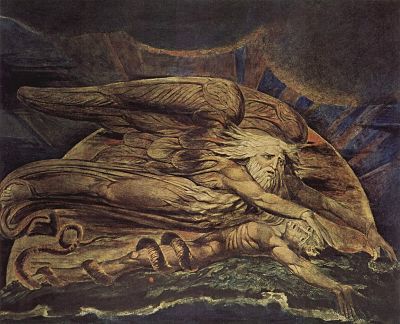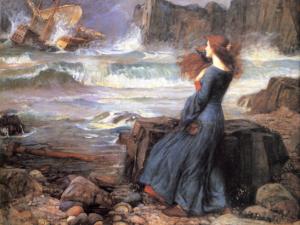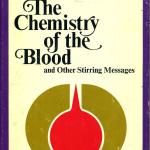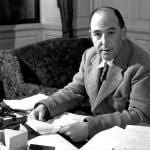 God is great. How great? Think great and then imagine greater. There is no possible world where God does not exist and no human that God does not love.
God is great. How great? Think great and then imagine greater. There is no possible world where God does not exist and no human that God does not love.
You and I might not have been born, but now that we are born, we exist. Nothing can change that. There was a time when it was possible that we would not be and then we were conceived. From that moment forward, our being was necessary. God who can do everything that can be done would not undo our existence, because this cannot be done. Once we were, then we cannot not be. God is different, because He was, is, and will be. He must be.
God is the one being who not only exists, but necessarily exists . . . at least if Saint Anselm is right. During his prayers, the saint developed, in a few lines, an argument for the necessary existence of God so powerful that some of the best philosophers in history (see Kant) have argued about it. Very good contemporary philosophers like my Biola colleague William Lane Craig and philosopher Alvin Plantinga have defended the ontological argument for God’s existence, though the majority of the profession is still not persuaded. Whatever one thinks of the argument, God is and God’s being, even the possibility of such a being, is awesome.
Most humankind (outside a globally declining group of secularists) know the Divine exists from experience and through other arguments. Once you know God exists, the ramifications are awe inspiring. First, you know that you might (just might!) be able to find total goodness. How good is that? Totally good and saints, sages, and sinners have been happy about this news ever since. The philosopher Anselm says, “Now, this is that single, necessary Being, in which is every good; nay, which is every good, and a single entire good, and the only good.”* (Kindle Locations 860-861).
Absolute beauty also exists if God exists. If Plato is right (and he usually is) and beauty inspires love, then God is a source of absolute romance. This is all very good news. We may be broken, but God is omni-competent. God has chosen to save, everybody gets mercy if we wish mercy:
O compassion, from what abundant sweetness and what sweet abundance dost thou well forth to us! O boundless goodness of God how passionately should sinners love thee! For thou savest the just, because justice goeth with them; but sinners thou dost free by the authority of justice. Those by the help of their deserts; these, although their deserts oppose. Those by acknowledging the goods thou hast granted; these by pardoning the evils thou hatest. O boundless goodness, which dost so exceed all understanding, let that compassion come upon me, which proceeds from thy so great abundance! Let it flow upon me, for it wells forth from thee. Spare, in mercy; avenge not, in justice.* (Kindle Locations 682-686).
God does not save us a little bit or so that we can suffer. Our suffering in this life is what God is saving us from so that we can delight in God’s goodness. Everything good will be redeemed, every pleasure find the proper place in God’s economy, and nothing will be lost or forgotten that should be found or remembered.
Finally, if there are many great delights in delectable things, what and how great is the delight in him who has made these delectable things.* (Kindle Locations 868-869).
How happy can we be? We will be as happy as we can be and, sadly, at the moment, we are too slight, too weak, for the strong joys of Heaven. We must love more, grow up in this life, redeem the time to get ready for joy. That joy is coming and it will be strong pleasure, great delight. If humankind is warned by God to turn from tainted pleasures, then it is so we can enjoy those pleasures when they are pure and undefiled. There is a great joy coming.
But if they shall so love God with all their heart, and all their mind, and all their soul, that still all the heart, and all the mind, and all the soul shall not suffice for the worthiness of this love; doubtless they will so rejoice with all their heart, and all their mind, and all their soul, that all the heart, and all the mind, and all the soul shall not suffice for the fulness of their joy. (Kindle Locations 912-914).
Anselm ends his prayer having seen at least one big idea (the ontological argument) and many theological truths. He starts broken and ends anticipating joy. Is he still broken? Surely, he is. We all are, but with the hope of a joy to come, faith in God that exists, and a love that drives us forward to Paradise.
I pray, O God, to know thee, to love thee, that I may rejoice in thee. And if I cannot attain to full joy in this life may I at least advance from day to day, until that joy shall come to the full. Let the knowledge of thee advance in me here, and there be made full. Let the love of thee increase, and there let it be full, that here my joy may be great in hope, and there full in truth. (Kindle Locations 929-931).
———————-
Based on class discussion at The College at The Saint Constantine School.
*Saint Anselm (2009-06-09). Proslogium; Monologium; An Appendix in Behalf of the Fool by Gaunilon; and Cur Deus Homo – Enhanced Version. Christian Classics Ethereal Library. Kindle Edition.















